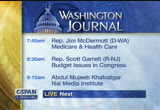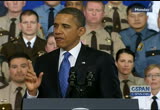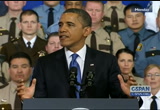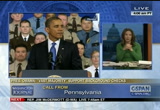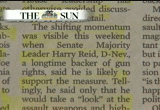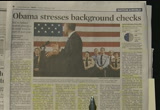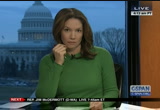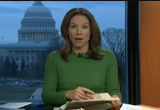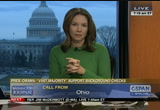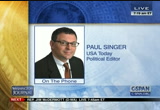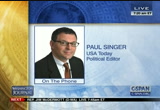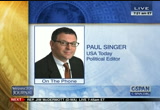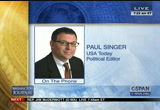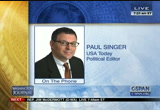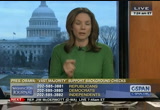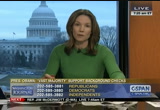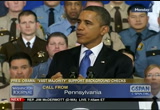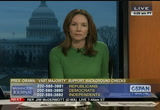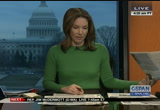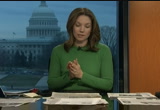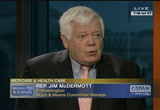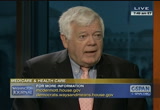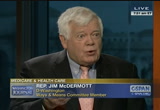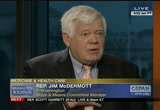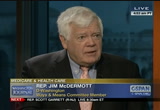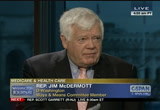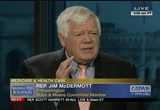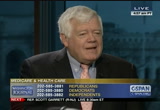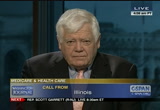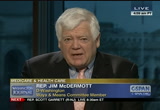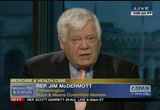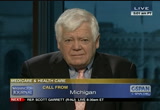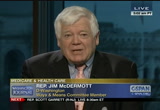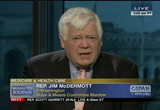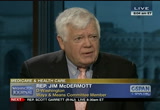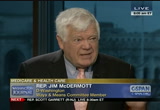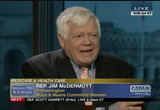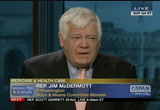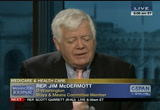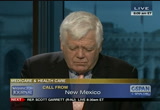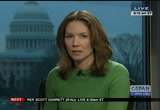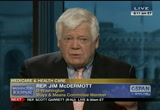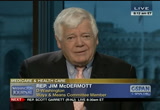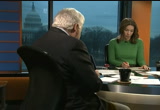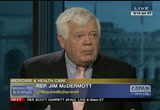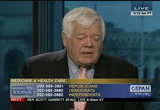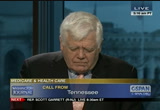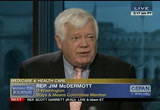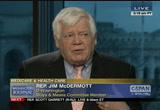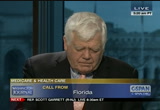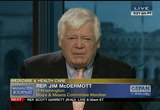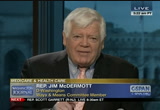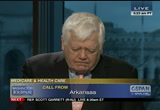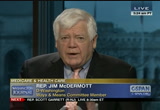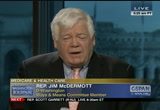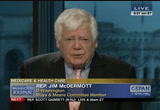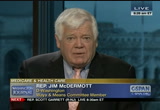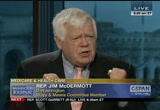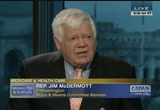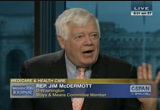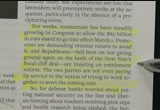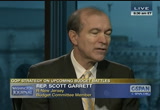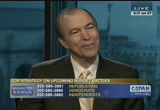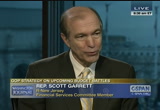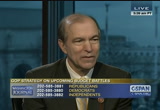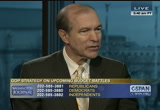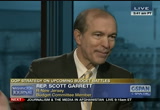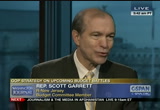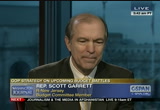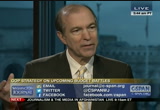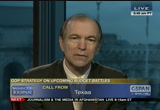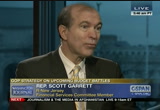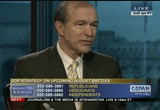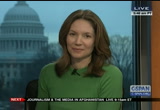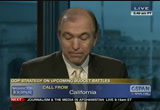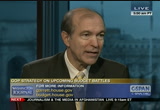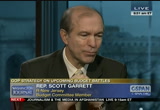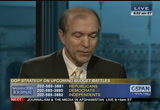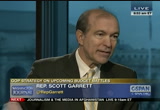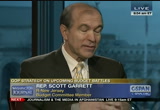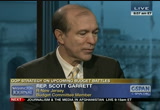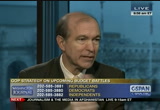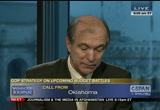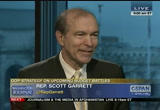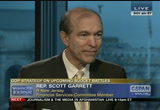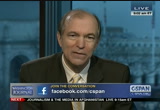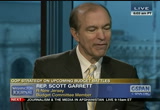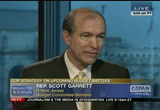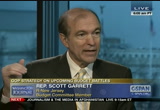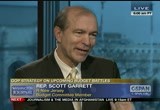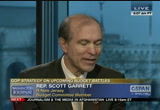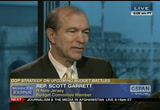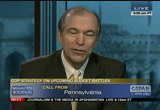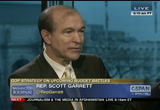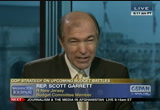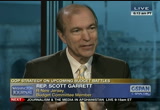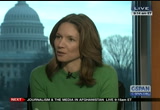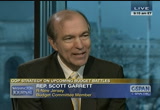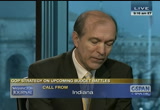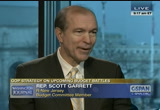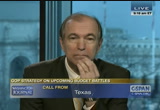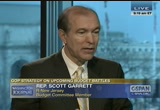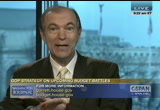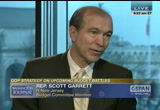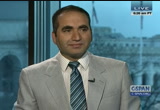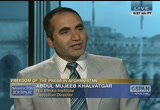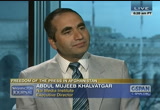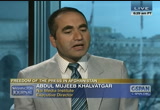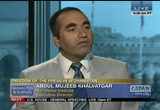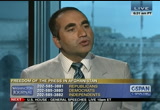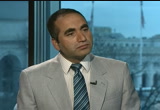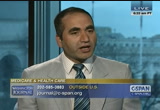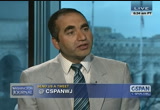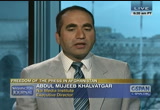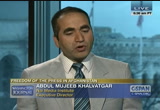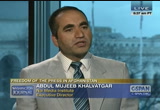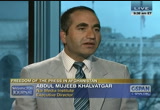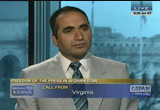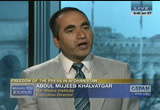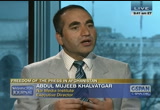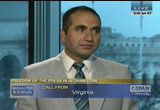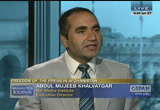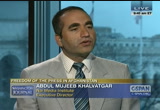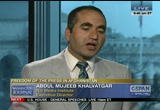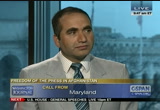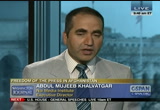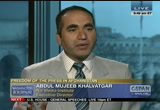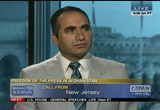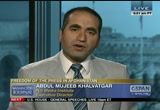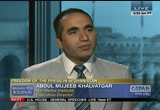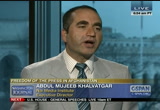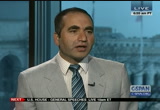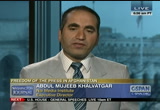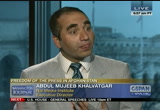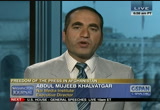tv Washington Journal CSPAN February 5, 2013 7:00am-10:00am EST
7:00 am
scott garrett, a member of the financial services committee and executive director of they nih it institute said afghanistan. ♪ host: good morning, everyone. welcome to "washington journal." here are the morning headlines. yesterday the senate voted to begin debate on the renewal of violence against women act. the bill will then move to the house by the end of the week. congressional budget office will give its 2013 economic outlook. and the no. 2 republican, eric cantor, outlined the gop agenda. look for our coverage of those events and more on c-span.org. gun control is dominating the
7:01 am
newspapers this morning with reports that both sides are likely to agree to criminal background checks, but an assault weapons ban might be harder to pass through congress. president obama said the vast majority of americans agree with the proposal. your thoughts? for democrats, 202-585-3880. for republicans, 202-585-3881. for independents, 202-585-3882. also, on social media, twitter.com/c-spanwj. or post your comment question on facebook. and you can e-mail us as well, journal@c-span.org. president obama was in minneapolis yesterday talking about gun control. here is what he had to say on background checks. [video clip] >> the vast majority of americans, including gun owners, support background checks for
7:02 am
anyone trying to buy a gun. [applause] so, right now democrats and republicans in the senate are working on a bill that would ban anyone from selling a gun legally for him -- selling a gun to anyone legally prohibited from owning one. that is common sense. there is no reason we cannot get that done. that is not a liberal or conservative idea, it is a smart idea. we want to keep the guns out of the hands of folks who should not have them. senators from both parties have come together to propose a bill that would crack down on people who buy guns only to turn around and sell them to criminals. a bill that would keep more guns off the street and out of the hands of people with the intent of doing harm. [applause] by the way, in addition to
7:03 am
7:04 am
host: what are your thoughts on this, this morning? we are turning to you outside of washington to get your take on background checks and whether or not the vast majority support the idea. what do you think about the fact that the assault weapons ban is looking less likely to get through congress? people say that it is too hard to get through this congress. james, republican caller, you are up first. go ahead. caller: hi, how are you? host: good morning. what do you think? caller: i am telling the screener that i do not understand the question. i bought a gun for the first time last year, in 2012. in 9 millimeter.
7:05 am
the gun that i wanted was sold out, but women are buying them up. i had a background check. i went in, made a phone -- and they made a phone call. they look at you funny, i had to go away with my tail between my legs because i must be a bad criminal. of course, what happened was i was flagged for a couple of things i did 25 years ago. i had a dui and a misdemeanor harassment charge one-quarter of one century ago. i do not understand how these people are apparently getting through to try to get guns when a guy like me who is a law- abiding citizen my whole life its flag for something 25 years ago. but, i waited 15 days, i got a phone call, go into the process again.
7:06 am
i am a law-abiding guy. i may have raised a little hell, but i never killed nobody. host: james, what the think about this idea? do you agree, even though it was a hassle for you, do you agree with the idea of background checks? host: -- caller: everyone does. i do not understand the point. host: part of this is getting the reaction to president obama saying this and seeing if the american people outside of washington agree with that. also, the reports this morning are that the president of emphasis on this part of his proposal is seen as diminishing support for an assault weapons ban. what do you think about that part? caller: we have to stop looking at the gun and start looking at the problem.
7:07 am
in pennsylvania, when i was growing up, we had more access to guns than we have now. every the boy had a gun. we went to school with them, we walked down the street with them. there was something missing. these zero little boys doing this. this is a problem that is much deeper. there is something going on with these young boys that no one wants to address because you are talking about lack of fathers with black kids, lack of a fear of authority, fear of god, morality, at a kit. all the things that are passed down by a strong grandfather and a strong father. little boys used to be allowed to channel their aggression. now you have these psychotropic drugs. i think it is the feminization of the curriculum. i think that these little boys have to be able to get out there
7:08 am
and channel their aggression normally. host: what if the only thing that passes out of this congress is something with background checks on gun control. is that adequate to address everything you are saying? caller: well, it will not do anything. the laws are already there. i had background check and i am a law-abiding citizen. host: we are talking about universal for every kind of gun purchase. caller: i was just buying a handgun and had to go through the same thing. even at gun shows in pennsylvania, there is a guy with a computer there. i do not get this. host: blare, independent caller, georgia. what do you think? if the president is right and background checks are the only thing that get through the congress, is that adequate? caller: it will be the jim crow
7:09 am
lot of guns. i do not have an id to vote, i do not have an id to have a background check. they want to take our guns away and get them occupiers down here to rape our women and take our towns, defecate -- host: all right. karen, you are on the air. good morning. caller: hello, yes? mike wallace, the former journalist -- he passed away but could not have gotten a gun because he was diagnosed with manic depression. he was robbed in a parking lot at the grocery store, assault that the grocery store. he could not have a gun to defend themselves because he says he was diagnosed with manic depression on television. also, actress patty duke said that she had the same diagnosis. does that not mean that they would not pass the mental health
7:11 am
host: that is "the baltimore sun," this morning, reporting on the president's visit to minneapolis yesterday. stressing background checks as the most tenable part of the gun planned, with the president saying that only the assault weapons ban deserves a vote in congress. your thoughts? clinton, maryland. hello, can. caller: -- hello, ken.
7:12 am
caller: i support background checks. i am a member of the nra. i own guns. i have had friends ask me if i would sell them a gun. knowing that that is against the law. knowing that that has happened over and over again. you have no way of knowing what purpose that person is using a gun for. i do not know their mental capacity. i just believe that universal background checks will keep the guns out of the hands of people that mean ill will or have mental deficiencies. host: all right, richard, washington, d.c., independent caller. caller: i am for the registration of guns, but as far as background checks -- i mean, all of these shooters were supposedly law-abiding people.
7:13 am
[indiscernible] they have the right to protect their family. who is showing the guns, who is sitting on the guns? look at what is going on in chicago. they are locking these people up. that is something you can do. who has the right to tell someone else that they have the right to own a gun? that is insane to me. host: you do not agree with universal background checks? caller: all done should be registered. you should know that, if it is transferred to someone else. but on the paper i said you could defer.
7:14 am
you charge them again. host: "the washington post," reporting that today two democrats and two republicans plan to introduce a bill that would impose new penalties against gun straw purchasers. the four members -- host: we will be covering that press event here on c-span, look for the coverage on c-span 3 today at 2:00 p.m. of those members announcing their proposal on the house side. as we told you, the senate is drafting legislation as well, a bipartisan group of legislators working on that.
7:15 am
"the daily news," reports this, the popularity of background checks explains why charles schumer thinks that he can win the support of tom coburn of oklahoma for a bill. host: that is a little bit about what is going on in the house and senate on this. yesterday the president did not emphasize the assault weapons ban. we are getting your take on
7:16 am
that. richard, here in washington, d.c. let's move on to mike, also here in washington, d.c. democratic caller, go ahead. caller: am i on? host: you are on, good morning. caller: good morning. this is the first an important step in a complex problem, because something can be done about it right away. they are definitely part of the problem. it sounds like some of the callers, talking about family values, this is true, but how do you legislate family values to a free country? i think that the amendments to the gun control laws are very important first steps and we have to continue the dialogue and look at the problem on a deeper level to see if there is anything we can do in society regarding the mental and family issues going on.
7:17 am
host: you think the first steps are what? caller: amending the gun control laws so that it becomes more difficult to attain these guns. plenty of legal gun owners are doing these -- obtain these guns. plenty of legal doughnut -- legal gun owners are doing the right thing. the gun control laws, whenever they may be, they need to be stricter and more and forced at the local level. these are just as important as the mental health issues. host: duane, republican caller. caller: i was curious about them showing a picture i.d. from a driver's license or some other approved government card, making it more likely to establish the identity of the purchaser. i am definitely against the
7:18 am
straw buyers. that should be eliminated right now. there should be universal appeal for that. maybe a lot that you can only buy one gun at a time per year? the logic is that you can only fire one gun at a time. i live on the outskirts of cleveland and cleveland has a terrible crime rate. not as bad as chicago or los angeles, but still there is a lot of black on black crime with these young kids who have these small guns and their goods. they wear hoodies. late at night they kill innocent people waiting for a bus. host: how do you know that? caller code the tv news reports and everything. -- caller: the tv news reports and everything. unless there is a news blackout in washington, d.c., you must be aware of it. crime is terrible.
7:19 am
assault weapons, the reason that people want to buy those is they want to be prepared for a total breakdown of civilization. only the people with the weapons are going to be able to survive. host: all right, that is doing, ohio. this headline this morning -- "who owns guns in congress"? here is one of the reporters the work on this, political editor for the newspaper, paul singer. why did you do this survey? what did you find? caller, we thought that it was worthwhile to find out if members of congress are gun owners. they will be voting on gun control policy and we wanted to ask if they were actually gun owners, more or less in the same proportion as the americans there represent. what happened was the proportions were almost exactly the same.
7:20 am
2% of household reported had guns. the distinction in congress is that it is a very regional difference. many more republicans have guns than democrats, and by and large southerners. host: what does that mean for gun policy? caller: it is hard to know. it is very, very clear that there is a correlation between gun ownership and positions that saver or are supported by the nra. several people that we spoke to said that what we are seeing is a kind of cultural area for guns where if you grew up in a southern community and income -- conservative community, probably in a rural area, you are very
7:21 am
familiar with guns and are not in favor of gun control. if you grew up in a city, an urban environment with more guns and crime, you're probably less in favor of guns and more in favor of gun control. if that holds true, there is not going to be a huge majority in congress for gun-control. seems like it will be pretty split. host: including democrats? caller: including democrats, although a smaller number. some of the ones who were gun owners said that boehner is in favor of gun control. he said he was a gun owner, but that he believed that some gun controls, particularly background checks, are important.
7:22 am
there were 120 republicans that own guns, only 46 democrats told us that they own guns. 76% of congress answered our questions. host: why did people not answer your question? caller: they gave a variety of reasons. we had about 60 people total applying by saying that they would not talk about it. several said that it was safety reasons, that they did not think it was appropriate to talk about their security. several of them said that they did not want to tell burglars that they had guns, because burglars might try to come steal their guns, which was an odd answer. several told us that it was none of our business. our view is that as members of congress that have higher exposure than regular people. and then there were a bunch of people who did not return repeated phone calls, e-mails,
7:23 am
requests for answers. host: what about the leadership in the house and the senate? caller: harry reid of nevada is a gun owner, democratic leader. mitch mcconnell of kentucky, as i recall. we did not get an answer at all from john boehner, the house speaker. nancy pelosi does not own a gun. host: what about the chairman of the house judiciary and senate judiciary committees? the legislation is going to go to them. host: that is -- caller: that is one of the most interesting ones. senator leahy is a gun owner, but he is also a very strong advocate for gun control. he will be delivering one of the key points in the debate.
7:24 am
their committees are likely to be the first out the door with legislation. there will be interesting things coming from some unlikely he, coming from vermont, who lives in a state where gun ownership is not all that unusual. it will be interesting to see if he can thread the needle between a healthy respect for guns and a healthy concern for guns and gun safety. i think that he will be a very interesting player to watch. host: let me conclude by asking how you interpreted the president's remarks yesterday in minneapolis. what does that mean for passage? caller: i think it is clear that they do not have the votes for
7:25 am
assault weapons ban. there is a lot of stuff that they can probably get done, like a background check, but i do not think that they will try to push an assault weapons ban just to lose on the issue. and they will raise it as something that they would like to do, but i do not see it passing. host: thank you for your time. and we turn to all of you outside washington to get your take on this. you heard it from paul singer, that they do not have the votes for banning assault weapons, but perhaps universal background checks may make it through both chambers of the house and the senate, with the president saying that the vast majority of americans support that as well. we will keep taking your phone calls on this topic, but i wanted to get to some other news. this story is from "the new york singer, that they dotimes," this morning headlines -- "u.s. memo on
7:26 am
7:27 am
7:28 am
oncehis one, "senator's secret daughter dies at 87." host: that is the front page this morning of "the state newspaper." we will go to sarah in clark summit, independent caller. we are talking about president obama saying that universal background checks have the support of the majority. what do you think about this? what else do you think should be done? caller: first i have a question. i am a gun owner. hopefully i will never have to use it for anything that anyone else would have to use it for, but i do like the protection on our small farm. and we do shoot. we have taught our grandkids, we have nine. we are safe owners. we have a safe that the guns are
7:29 am
in that is always locked. my question to anyone who can answer is about free speech and the universal background check the we have to submit to when we buy a gun. i have never bought a gun, and i have purchased several, without what i would consider a -- without what i would consider an extensive background check. host: what was that like? caller: they wanted to know about any felonies. gosh, it has been over one year. i was at his gun show in pennsylvania for well over two hours. i had to take a seat and wait. of course, i hopefully knew that it would pass, and it did. my husband, also. host: what do you think about this story from "the washington
7:30 am
post," this morning. both sides of gun control are turning to women on this issue of gun control. congress has raised the president's agenda to toughen gun legislation and powerful lobbies on both sides are turning to women. using advertisements and op-ed articles. what do you think about that? caller, turning to win? for this issue -- caller code turning to women? for this issue, i know -- caller: turning to women? for this issue, i know women who would not leave the house without a gun. then i have met women who found out that i have a carry licence jumped away from my pocketbook by 5 feet. i had to laugh, she was actually sitting next to me for about four hours. there was an interesting gentleman at my table and he
7:31 am
asked me questions about my new purchase. he was very informed and she said -- oh no, you have a gun? she jumped up. i said no, i do not have a gun. i said that i carry but i do not have it now. i would have to say that it is probably about and it has to do with where they lived in the united states. :50, myably about 505 relatives in the inner city did not agree with it. host: you think that women are about 50:50 on that? caller: i think so. host: front page of "politico,"
7:32 am
this morning, "eric cantor, seeking to reran gop." we will be covering that event today. jim, loraine, ohio, hello. caller: how are you this morning, greta? host: good, how are you? caller code doing fine. i am very interested in this subject. as an experiment i went to a gun show and spoke to a lot of gun owners and ask them a lot of questions. one of the first things i asked them is why they are opposed to these different things they are proposing. one of the common themes that came out was that gun owners fear that this is just -- that if they ban assault weapons, high-capacity magazines, that eventually there will let -- there will be another tragedy
7:33 am
and then the anti-gunners are going to demand that these people give up their weapons. they will say -- look, there was an assault weapons ban and a ban on high-capacity magazines and we have to take them away from law-abiding citizens. that is what they are afraid of. i think that if these people would come out and say -- look, we will not take your weapons, we promise you that we will never confiscate your weapons and we will never ban them from ownership, that might help the cause. they are also afraid of this universal background check. they are afraid of -- how can i say this? they do not really dislike the universal background check, but they are afraid that it will be used as the fact of gun registration, that the government will use it to know
7:34 am
who owns the guns so that they will know where to get your guns. host: what do you think about that? caller: i can understand their concerns. i am not a gun owner myself, but they are demonizing assault weapons and high-capacity magazines, yet the police have taught us all weapons and high- capacity magazines. why do they have them, they asked me? they said because they are the best available weapons for self- defense. so, police officers, should the average citizens not have that same right? host: this is from twitter --
7:35 am
host: a couple of comments from twitter for you, twitter.com/c- spanwj is the handle their. this is from "the washington times." host: so, that effort moving on the state level. if you want to see what your state is possibly looking at doing. also from "the washington times," "college presidents oppose more guns on campuses." host: this is inside of "the washington times," this morning, if you are interested in that article as well. other news, front page of "the washington times," president
7:36 am
misses fourth budget deadline, a gop house races red flag. host: speaking of the budget, the congressional budget office will give its 2013 economic outlook today at 2:00 p.m. eastern, sure to be making headlines tomorrow and getting reaction as well from lawmakers. on the nomination of former senator chuck a deal as defense secretary -- shut cahill -- chopped hegel -- chuck hagel on defense secretary. on immigration reform, "use an -- unions sees immigration debate in the hope that
7:37 am
organizing workers can swell the union shrinking ranks." host: that is "the wall street journal." the judiciary committee will be kicking off immigration reform. also, the house oversight and government committee will be looking at spending and we will be covering that as well on c- span.org. this piece reports that new york medicaid executive pay is sickening, that they funded not for profits in new york and are hauling in massive salaries with one top honcho ranking in 4.8 million by an explosive -- 4.8 million, an explosive congressional report has found. this report shows that these
7:38 am
medicaid funded services have these executives making that much money. back to your phone calls here, your comments about the president saying that there is vast majority of support for background checks a month americans, not giving much attention to the assault weapons ban. chris, okla., what do you think? caller: this is a great discussion your having. i wanted to add a couple of comments. the first one is that the hunter interview was very interesting. it is curious that most of the democrats would not even answer the question that they were gun owners. in the senate, particularly the house, either they did not want people to know, or they did not want people to know that they did not have a gun. that was curious. host: what do you make of that?
7:39 am
caller: all they are doing is politicizing the thing, not being honest. but my second comment is that i live next to a section 8 housing complex. i am a homeowner and the joke in my family is that i did not drive around the block when i bought the house. anyway, there is gunfire going off here all the time. i guarantee that your listeners would understand the situation i am in. i have to be able to protect myself. i am a gun owner. i am not excited about it, it is just what we have to do. but with the section eight projects, this is a problem the government has created. host: this had line -- "-- headline, "gun-control groups
7:40 am
first skewer wavering democrats." host: tommy, florida, independent line, a low. -- high, tommy -- ji, top -- hi , tom a. caller: i feel like the department of justice should enforce the laws on the books. we have more gun laws than any other country in the world and we do not enforce them. if we did that, i can guarantee you that this violence and this other mess would decrease. this idea that only women should own guns, they are more victims of violent crime than what --
7:41 am
and men are. of course, i know that is impossible and sexist, but like i say, if i was a woman i would want to defend myself against men the like to hurt whitman. host: gun violence, -- hurt women. host: gun violence, will it go up or down? caller: i think down. host: trenton, new jersey, democratic caller. caller: i will have to change my comment after listening to your last caller. i will put this out there. i hate to talk about it, it is really personal, i have never really held a gun. i have friends with guns and i had to move from one place where i was babysitting a 3-year-old who was looking through her mother's purse and the gun was sitting on the counter. my heart went into my throat and
7:42 am
i thought -- time to find another job. i spoke to my husband about child support, i was so upset, i had been in an abusive relationship for some many years, i did not know what to do about it. sometimes your family does not want to get involved. i felt like i needed a gun for protection. thank god that i did not know how to use it, i went over there to be heard, not to harm. things happen in marriages where we go temporarily insane. thank god that they did not throw the book at me in florida. that is where i was living at the time and i would have had to spend five to 10 years at the time. as it was, i took a plea. i did not lose my right to vote, which is great, it makes me feel like an american. i felt that the justice department they're actually treated me fairly with what i was charged with, but i think
7:43 am
that the more guns that are out there that are acceptable, the more crimes we will have, the more deaths, family things and emotional things. the lessons that we have, the less access we have to them, the less murders there will be. that is how i feel. host: this is from jeff brooks on facebook -- host: randy, republican caller, hello. caller tell my, my, my. first of all, the common -- caller: my, my, my. first of all, the comments that the president made, that is very false. another false thing being spread is buying assault weapons. you have not been able to buy
7:44 am
assault weapons since the 1930's. the guy from "usa today," during the report on guns with republicans and democrats, then he turns around and talks about people in the city. republicans are all about the country? these tragic shootings that happen, that will jump into the person. these shooting are to it -- the shootings are terrible, terrible things. the media picks it up and they talk about it and talk about it. there should be silence on the shootings. the districts, the communities that have to bear it -- the way the the media it explodes this and talks about it is terrible.
7:45 am
one of the reasons is so that they can get more regulations, not to save these poor kids and people that have been shocked -- why would they have to have more laws when they have ones on the book that they do not use? host: we got the point. we have run out of time on this. coming up, switching topics, talking about medicare. later we will talk with scott garrett about the gop strategy over the republican -- on the republican strategy for the looming budget battle. we will be right back. ♪ [video clip] >> julia loved her time in the
7:46 am
white house. in her memoir, she said that it was a bright, beautiful dream. i think that gives you an idea of how much she enjoyed being first lady and how much she felt her husband had finally achieve the recognition that he deserved. >> judy gramm, who married her -- married her brother's west point roommate, ulysses grant. produced by the white house historical association, sees a number one begins on president's day, 9:00 p.m. eastern and pacific on c-span, c-span radio, and c-span.org. >> the thing that you want to remember is that when he left office, the budget was lower than when he came in. that is the story now.
7:47 am
how did he do that? did the economy grow a lot? unemployment was below 5%. the budget was balanced because of his own parsimony. how did he manage to make the budget go lower? how did that help the economy? it was a lot, he got the government out of the way of the economy. >> the life of the 30th president of the united states, "coolidge," on sunday, 8:00, on q&a. >> "washington journal" continues. host: we are back with congressman mcdermott, the ranking democrat on the house subcommittee. let me read to you from "the national journal bailey," and what they had to say about sequestration -- national journal daily," and what they had to say about sequestration.
7:48 am
host: true, accurate reporting? caller: -- guest: as far as what i can tell, that is exactly what is happening. unfortunately for the american people, the leadership on the republican side is still acting as though the election never occurred. they have got to except that the people have said that they once what obama is doing. they reelected him overwhelmingly. and they have to work to make that happen. unfortunately, they are still trying to block things. we have kicked the fiscal
7:49 am
problems down to the end of march and i suspect we will kick them down to the end of june. we will just keep doing this and never get to the real problems that face this country. host: why not come to an agreement on this? this editorial from "usa today," saying that even if the sequestration happened, it would barely even touch the government's borrowing trajectory. guest: first of all, the republicans need to admit that this is not a spending problem, it is a revenue problem. they paid for two -- they put up
7:50 am
two wars that we never paid for. they are simply willing to spend money. they gave tax cuts and never paid for them. in the end they have eroded the revenue of the government. some of it is coming back. the wars are winding down. the economy is picking up. but there is a real health care problem that we have to deal with at some point. it will take some revenue. you cannot just do it by magically saying that it will fallout of the sky. you cannot cut enough to get the debt down without talking about revenue. i think it they did a little bit here at the end of january 3. everyone gave the office and will not give again. host: this editorial from "usa today," de say that it is not a spending problem -- but "usa
7:51 am
spend money. today," others, saying that it is. guest: let me explain. the average cost spent on a senior citizen in medicare is flat. it went up 0.4% last year. it is flat spending. the fact is that beginning in 2011, all the children born after the second world war, the so-called baby boomers, are coming on. when i came to congress in 1989 there were 35 million seniors on medicare. 30 million people altogether. we have 80 million people coming on to medicare. we simply have got to deal with the fact that the population is going to need more spending. it is not that spending is out of control, but republicans, what they are saying is that they want to do is keep them
7:52 am
from getting on to the program. that is why they want to talk about raising the retirement age from 65 to 72 or 80. that would really solve the problem for the government, but not for the senior citizens or the american people. they would still have to find a way to cover their health-care costs. what they would do is do what they did before medicare. turn to their children. your mother or father would come to you and say -- i have no money to take -- to go to the doctor, can you take care of this bill? that is what happened before 1964. now they are saying they want your mother to be 75? from 65 to 75? they are not saying that, but if you look at what is going on, democrats are simply not willing to do that. we are going to find the money to cover all of the senior citizens in this program at 65.
7:53 am
host: no cuts and but -- no cuts to benefits, democrats will stand by that? guest: democrat -- benefits are rising. we have provided a number of revenue -- host: to the doctors. guest: hospitals, doctors, providers, there are all sorts of ways to save money. it is saying to doctors -- be more efficient. the united states spends 18% of their gross domestic product on health care. in france they spend 11%. in germany it is 12%. we are spending way more and do not have everyone covered. is an inefficient system and it is the inefficiency that needs to be driven out. right now there is an incentive where a doctor gets paid more if
7:54 am
he does more. that is the wrong incentives. the incentive should be that you get paid more if i keep you healthy and that does not mean doing more tests or x-rays or anything else, it means understanding your disease and managing it affectively. -- effectively. host: john boehner came to the floor yesterday. talking about president obama and the budget, here is what he had to say. [video clip] >> the president believes we should not be having these problems. maybe then it would not be so disappointing that his budget is late. well, we are having trouble in large part because spending is the problem. it chases jobs overseas and causes anxiety about the future. one example about something the president's budget could have address is the sequester.
7:55 am
that is washington speak for automatic spending cuts. this was first proposed by the president in 2011, insisting that it be part of the debt limit agreement. the house has passed legislation to replace the sequester with common sense reforms to preserve and strengthen our safety net for future generations. host: congressman, your reaction? guest: first of all, when you have the problem but he had, until the third of january it is very hard for the people of the white house to put a budget together when they cannot get resolution on the issues at the last minute. the fact that it has drifted over a few days, it will come out in the next week or so. that is no catastrophe, not the end of the world as we know it.
7:56 am
really, it is directly related to the extension that we went through during a lame-duck session. you should not word that use cut -- you should not use that word, spending and spending. he never talks about what we spend it on. he never says that the wars were a bad idea or that the giving of tax rates was a bad idea, or that medicare part b, the drug benefit without paying for it was a bad idea. he just says that they were spending too much. they were in charge when those things were put in. now they need to put on the table what they want to cut back. they want to cut the military and make this across the board slashing out of everything. that is nonsensical. you should know what you are cutting. i believe in surgery, not a meat ax.
7:57 am
host: on medicare, what would happen? guest: an interesting question. no one has given us what they would cut out. 10% of the patients getting paid for? doctors getting 10% less? there is no specificity. you can sit here and talk -- we should just cut across the board. let's talk specifically about how it affects -- they will not come to the table and -- you see, this test to start in the house. constitution makes this a house responsibility, not a presidential responsibility. if they want to do that, lay it on the table. let me see the specifics of what you want to cut. then we could have a discussion. host: all right, carl, chicago,
7:58 am
let's get the viewers involved. carl, go ahead. caller: power you, greta? host: good morning. caller code to make two points -- caller: to make two points, we can afford it. second, we have been going through 20 years of trickle-down economics. the prosperity in the country was measured in dollars and could be anywhere from one quarter of $1 trillion per year to $1 trillion dollars per year. according to david stockton, only 10% of americans share their prosperity. we have the money in this country to do these things, we
7:59 am
basically just -- i am not trying to put this on republicans, the economics we're following right now, these economics, they are around the world benefiting from this. we have to do something about taking this out of the health- care system. guest: i agree with your analysis. we have the money in this country to pay for health care for all of our senior citizens. there is no question that we have the money. if the swedes, the germans, and the italians can do a, the united states can do it. anyone who says that we cannot is down selling america, far as
8:00 am
i am concerned. there is a question about the revenue. when george bush came into office, he had a surplus. he was worried about a surplus. he began to give tax breaks. the original tax breaks of george bush, along came 9/11, then you were into war in afghanistan. and these are all things that we did while
8:01 am
in iraq, and then all these things we did. we need to pay taxes and do it fairly. it is not fair right now when the top .10 of one percent is accumulating money at a rate that is unbelievable for those of us in the lower half of the economic ladder. the number one cause of bankruptcies in this country is healthcare bills. the average american is scared to death that they will get sick in iraq and they will not be covered. we have inequities that we could fix with the tax structure. it is a matter of political will and >> edward, caller. -- host: edward. caller: thank you for taking my call. representative, i have been around for a while, and george palestra -- george bush did not inherit a surplus.
8:02 am
it was on paper. as far as him going along with spending programs, i do think he was trying to appease the democrats. i thought it was wrong then. when obama went into office, he upped the government agencies, doubled, tripled their budgets, and now you do not want to come to a fair and equitable conclusion. you want to say it is the revenue. how about all government agencies, all employees go to a flat $82,000 a year? -- $52,000 a year? thank you. guest: we could spend much more time talking about the economic situation george bush inherited. the fear was the united states
8:03 am
would have no debt and wall street said that was a bad situation. that is why he gave away the tax breaks in 2000 when he came in. you want to keep a certain amount of debt in the economic system so that we can trade paper in other countries for borrowing money. that whole system was thrown off by the fact that two wars were not paid for and we did not pay for the tax cuts. they were given away as if we did not need them. it was part of the surplus. the business about going to $52,000, i am not sure why you
8:04 am
would pick that number, but in a society where we want people to have a living wage, $52,000 is a real struggle to rid there are people making $52,000 -- struggle. there are people making $52,000 that are struggling. i am not sure why you would pick that number, but in a society where we want people to havethat is a soviet answer. i am not sure how you come up with $52,000. why? host: entitlement spending, if you could, if you support it or not, raising the eligibility age, you say you are not open to that. guest: we already have a means testing, but one of the dangers of doing that is if you make it so tough, people would say why should we have the program? i am not benefiting from it. we want a program that covers everyone in the country. it is a social insurance program. if you are rich, we do not say the fire department will not come put the fire out.
8:05 am
on police and roads we do not means test. we do not say if you have a lot of money you have to pay $25 every time you backed out of your garage. that is not how society works. host: health-care entitlements could require more out-of-pocket from patients. guest: the average senior is spending $3000 a year, not paying for eye glasses or hearing aids. they are paying for a lot. they are averaging $5,000. it is easy for a congressman to talk with an idea like that, but when you think about senior citizens living under $40,000, and that is the average, how do you say you should pay more than $5,000? you should find ways to make it
8:06 am
more efficient. host: the formulas used for cost-of-living increases could be tweaked to make the raises slightly less generous. guest: that is an interesting idea. it costs what it costs. if you and i throw in an extra dollar or $10 -- we saw some cheese in the grocery store, it cost six dollars, or $10, it is not a big dealit costs, but if e living on social security, that is 2500 maximum per month come a paying rent -- per month, paying rent, you do not have the extra money. it is an easy idea but it does not solve the problem had -- problem. host: "usa today writes" --
8:07 am
guest: if you are going to say that you get what you pay for, you will have an unjust society. there is not any one of us that has not benefited from the contributions of other people. i went to a university medical school and paid $800 a year in 1963. i could not have paid for that out of my own pocket. the people of illinois paid for that medical school. today, we have shifted the cost to the dr.. the average dr. comes out $175,000 in debt at age 25. you could shift the cause -- cost and say whatever you get, doctors will pay a lot of money to pay off that debt.
8:08 am
you do not get anything for free. host: you where the chief psychologist at long beach naval station in california. how long did you practice? guest: i came out of training in july, 1968, went to the united states navy, and belt with peak -- dealt with people coming back from "apocalypse now," essentially. the involvement that john kerry had, i saw the people on those boats. host: did that inspire you to run for congress, serving in your 13th term? guest: absolutely, i came back in july of 1970 and was elected.
8:09 am
i think war was generally destructive. that is why i opposed the iraq war. i have seen the movie before. i know what is coming back from iraq and afghanistan and i did not want it to happen. we are inundated with suicide and all kinds of problems in our society. that had an impact on me, john kerry, chuck hagel -- a lot of us went through all of us to understand what war is all about. host: a little background as we talk to jim mcdermott. wayne, a question or comment for the congressman. caller: healthcare, medicare stuff like that, -- medicare should stay with the younger -- elder folks that earned it. healthcare, right now, it should
8:10 am
be with the company's. right now i am with a -- i am a truck driver. we have to pay for our own medicare. say i am making $10 an hour, and they tell me monthly i have to pay $600 a month. just to cover my family insurance, just to cover my medicare. that hurts. that hurts me. that is taking more money out of my pocket just to cover my family when we are spending on food, clothing and everything else. host: you are on medicare and not medicaid? caller: medicaid also. medicaid is the government had
8:11 am
-- government. the government gives you the tools to get medicare, but that is coming out of my pocket also. it is coming out of us, middle- class people. host: let's get a response from the congressman. guest: the way i look at the society, we have to think about the common good, and i believe we all pay taxes and we should get help with the problems that face us. if it is medicare, which people pay their entire life, at 65 they start to draw medicare. if it is medicaid, the state program that the federal government pays 50% of, it is a program for people that have reduced income, up to 130% of income -- 138% of income.
8:12 am
it is for very poor people were people that cannot cover their problems. if a society is going to say -- be humane -- we could tell people tough luck. you could see that in some countries in the world, but that is not the american way. the american way is to help the person in the street and do it collectively. i personally think the country can do it. we have a problem because medicare has been so successful. the length of life has gone up 10 years. when it was designed, it was not designed for people to last as long as they are. when i was a kid if somebody was 80 years old, you thought they were really old. today, 90 years old is almost nothing.
8:13 am
it is a problem for society, but we have the ability. americans can do it. they do not have to say you cannot have health care, or you are on your own. that is what i do not like about the things that republicans offer as answers, which generally amount to you are on your own. host: run on twitter says we are spending 40% of gdp on administrative overhang -- overhead, government, leaving no room for growth area -- growth. which generally amount to you are on your ownguest: i am not sure whs getting those figures. host: in "the wall street journal" this morning, an aversion to new taxes is squeezing most remaining government activity.
8:14 am
guest: i would basically agree to that. there is basically an aversion to paying taxes, and we have deficits caused by wars, tax cuts, and all of the things that we talked about, and there are more people retiring. we could say that is too bad, they lived to long -- right -- too long -- one i was growing up, my grandmother had no medicare, no social security, and she lived with her daughters. i slept on the couch in the living room because that is how families took care of seniors before 1964. now we have a medicare program, where my father lived to 93, my mother lived to 97, and we did
8:15 am
nothing for them except pay for their taxes. one year we gave my mom a christmas gift, a hearing aid which cost about $800. host: medicare does not cover that? guest: medicare does not cover that. good luck, you are on your own is what we say to seniors. my view is we are a better country than that. we can find a way to do that. there is a lot of stuff done in this country where people are getting treatment or examinations that are not making their health better or their life better. we have to look at that and stop doing that kind of stuff. that means with the healthcare profession, everyone has to figure out the most efficient way to do it. host: how long will that take?
8:16 am
guest: the pressure is on us, and people will do what has to be done when they realize we only have so much money, so many people to take care of, and we have to figure out how to do it. they will do it. doctors and people that run hospitals are smart, and they can figure it out, they just like the way it is going now. host: larry, tennessee. caller: we have a lot of people in this country not doing too well, but politicians and rich people seem to be doing pretty well. politicians built their own pay raises, their own benefit. republicans have problems with unions.
8:17 am
they get together and vote for their own salaries, but they do not want people to do it. they are in office, tell a time they die they have no problem with government paying for them. they do not want to do anything for the common man. austerity -- everything they tried, the economy did not want. we need to put money into the hands of working people, and this country will take off again. host: larry, we got your comments. guest: let me deal with the issue of a. we have not had a pay raise in three years and congress has not given itself a cost-of-living increase. we are federal employees come a entitled to benefits -- employees, entitled to benefits
8:18 am
that any other federal employee. let me get to the issue of austerity, cutting and cutting -- it has not work in ireland, spain or great britain. we have to keep investing in a society. after the second world war, we were in debt, but we made a huge investment, the g.i. bill, handing a college education to every man and woman at served in the military and said you are entitled to a college education, and we were investing in the minds of people. we created the power and the creativity of this country by that investment. we are now putting all the cost of college on the kids, so they are now coming out in debt and they wonder if it is worth going to college because they cannot find a job. the government needs to continue to stimulate. in the infrastructure, it was a republican by the name of
8:19 am
eisenhower that put the highway system in place -- that was a major investment to put roads all over this country. now they are deteriorating, bridges are falling down, and we say we do not have the money to fix the roads. nonsense. we have to fix the roads, upgrade the water systems, deal with broadband and all of those things around the computer if we are going to continue to compete with the world. we have to keep investment -- investing. it is like saying for a house you will never fix the roof, paint the walls, just let it happen. you have to protect investments by continuing to invest. host: kathleen. florida. republican caller. caller: good morning. guest: how are you? caller: i am fine, thank you.
8:20 am
i do not understand how anyone can talk about how little the seniors get. i am -- i have more than one friend on medicaid, subsidized housing, delivery of their drugs, food stamps -- you reference an income on social security of about 2500. i am in my 70's and i do not get half of that. politicians talk about how wonderful healthcare is in spain, this country and that country. try going to any of those countries when you are not a citizen and get care. part of the problem we have here is there is absolutely no requirement for people who are here in emergency rooms because they have a cough or a sniffle,
8:21 am
but if i go to the emergency room and i do not have insurance, i cannot get care. host: we will have the congressman respond, kathleen. guest: let me take the last example because i think it is a great one to talk about the waste in our system. if you have doctors, medical homes, people that know you that you can get to when you have a problem, you can get to them and it costs very little. if you go to the emergency room at your local hospital, it will cost $1000 to walk in and open up a room. that is what they bill insurance companies. now, that is a waste of $1000 because it could have been done for maybe $50 with a visit to the dr. and our system is filled with those kind of problems.
8:22 am
if we set up clinics so that people could go see professionals, nurses come a physician's assistants or physicians, and not go to the emergency room, we could save enormous amounts of money. we simply have to develop those clinics. they are doing that in parts of the country had -- country. in the state of washington people to efficient healthcare. in other parts of the country, they are spending -- washington, they are doing efficient healthcare. in other parts of the country they are spending too much. maybe you should go to your congressman and say why am i not eligible? maybe you have, but the fact is you are eligible, and if you live in a congressional district i would be down at
8:23 am
their office and say i have no way to live because those programs are therefore people that do not have the capacity. host: laura chimes in on twitter thomas doctors hate this -- twitter, doctors hate this system, starting to the sea- four-service set up. william. arkansas. caller: good morning, congressman. as an iraqi veteran, congressman, i am extremely concerned about the closing of vertical facilities for -- medical facilities for veterans. in the 1990s we closed an air base inarkansas.
8:24 am
memphis, and it takes six months to get care for a veteran in memphis. it concerns me that we are continuing to close these military bases yet we are doing nothing to take care of the veterans. i would like to hear your response. guest: i said a little bit about it earlier. it is fine and good to go marching off to war. remember we were told we would be out of the rack in 6 -- out of iraqi and six months? the people that said that, i knew were blowing smoke. the real question is the total cost of war, what happens when people come home? we have people going 3, 4, five and six rotations. it is all volunteer. memphis, and it takes six monthswhen i went in in them era, i was drafted because
8:25 am
everyone had a responsibility to serve in the military. i think that is a good idea, personally. this country does tremendous things for me, and i have a personal responsibility to give back, but we do not act that way, and we treat soldiers as some kind of group that is over there and we will not worry about them and keep cutting benefits. they were promised all kinds of things when they enlisted. when they are injured or there is a long-term problem, suddenly you have to stand in this line and it takes three or four months to get in. that is not right. this is the real tragedies of the wars -- what happens to the families and the men and women who serve. you have women that have been away from their kids for three or four years serving in iraq because they were in the
8:26 am
national guard unit, they were mobilized and kept in. host: george in new jersey. democratic caller. caller: hi. representative, do you not think that the system of government that we have now that has been going on since rome is basically not working, has never really worked, and once you get into your seat, you can sit there forever, basically. it seems the system is working on bribery, lobbyists bribing people, and once you are in that bubble of washington you no longer are a person. you are above the people, so this system seems to be broken. with all the likes on facebook,
8:27 am
could we if not get rid of the congressman, be in a position to vote ourselves, and have the people on the streets doing the dirty work have a say in the government. to say that government needs the people to vote, it does not work anymore because we have computers to do this. eventually we will have to vote by getting into the street and reacting like egypt. guest: i would agree that we have problems, but i think the form of democracy we have in the united states is one that can and has functioned through difficult times. if you look at this country, we started in 1789.
8:28 am
women did not vote for 120 years. what kind of democracy is that? we had slavery for 75 years. if you look at what has happened to gaze in this country -- gays in this country, over the last 30 or 40 years we have changed our relationship with the gay population. this society changes in response to what is going on. we are in a difficult time right now because we have a lot of people that suddenly think it is about me. it is not about me. it is about we. if we do not take care of one another and say everyone is on their own, it will simply fall apart as a society and become a mob scene as it was in paris.
8:29 am
you can see what a country can become if you do not have equity. i do not want that. i want people to have a peaceful life and i think our system will work. host: sal on twitter wants to return to the so-called dock six. why are they always -- doc fix. why are they always trying to cut doctors salaries? do they cut their own? guest: when we started medicare , we said doctors can submit usual and customary fees. if i do something for you, and i send my bill to medicare, and i say $1000, and medicare pays me $800, they say then -- i say they did not pay what i was
8:30 am
worth, so we are paying their fees, but not as much as they want. now, it will be a question about whether we pay for volume, do more, get more money, or do more and get better quality. we are trying to shift to quality. doctors will have to negotiate with us. host: before we let you go, the affordable care act, 2013, what might be one or two headlines coming out about that law? guest: it is the law of the land and it will be implemented in 2014, and the headline you will see is states gradually moving into joining it. only 20 states have said they will move forward with it, but you will see other states begin to say we want to control what happens to the people in our
8:31 am
state rather than let the federal government come in. host: "the wall street journal" editorial is very critical of the arizona governor saying that the laws perverse incentives and the health lobby have captured the arizona governor. guest: that is typical "wall street journal." the fact is people come into the hospital, they do not receive payment, it becomes uncompensated care, and the doctors are saying how can you turn away money for patients that we see and we do not get paid for? it is nonsense for a government to say i will not take 100% of the money. i think the governor made a reasonable, smart decision. the same thing happened in ohio
8:32 am
, john kasich, who used to be anti-government and all that stuff, he said send me the money. host: dummerston mcdermott, thank you for talking to our viewers -- congressman mcdermott, thank you for talking to our viewers. we'll talk to representative scott garrett, then the media in afghanistan. first, an update -- update on c- span radio. >> as president obama works to fill his cabinet for the second term, reports say he is looking at women, the keynote and openly gay at its four top slots. people say the leading candidate for commerce secretary is a longtime ally of the president and a chicago fundraiser. the top candidate for the office of management and budget is
8:33 am
sylvia matthews burwell. a new report released today says 54 countries cooperated with the global kidnap, detention and torture operation mounted after 9/11, many in europe. the report was compiled by the open society justice initiative. the states include pakistan, afghanistan, egypt and jordan where the existence of secret cousins have been documented for many -- prisons have been documented for many years, but the report also lists ireland, -- iceland, cyprus. the report coincides with john brennan being questioned about the enhanced interrogation policies adopted by the george w. bush administration.
8:34 am
eric cantor in remarks earlier today said the gop must explain why we are doing what we are doing, adding that the party needs to broaden their political appeal as part of a major policy address he is set to deliver today at the american enterprise institute. you can hear congressman cantor live on c-span radio or watching on c-span. >> julia loved her time in the white house. she says in her memoirs it was a bright and beautiful dream, the most wonderful time of my life. i think that gives you some idea of how much she enjoyed being first lady and how much she felt that her her husband had finally achieved the recognition that she -- he deserved. host: julia grant, who married her brother's west point
8:35 am
roommate, ulysses s. grant. "first ladies" produced with the white house, season one begins february 18. >> "washington journal" continues. host: we want to welcome back scott garrett. let me begin with you where we began with our previous guest jim mcdermott. this is "the national journal daily." is this accurate reporting? are the $85 billion in automatic cuts go through in -- on march
8:36 am
1? guest: it seems we are going in that direction. republicans have taken the position that the obama administration has gotten the tax increases they have want. taxes have gone up on american families. revenue is up. now americans are asking congress to do the rest of the project, which is deal with the spending side of the equation and none of us want the across- the-board cuts you would get with the sequester. americans would like congress to do its job and try the areas that need to be cut. that is a two-way street. the white house has never set down on the other side of the table to engage. host: if the sequestration goes
8:37 am
through, $85 billion across-the- board, what does that mean for the economy? guest: it means we are implementing what was agreed to in a bipartisan agreement in the past cycle. remember, all the parties sat down and said how can we work this through, and what is the amount of money we need to be spending? republicans and democrats started at different points, but came to an agreement that we need to begin cutting spending to the tune of $1.2 trillion over 10 years, so basically it would be and lamenting a bipartisan agreement. host: so, what is the likelihood of this happening? guest: 80/20, 73, 20 -- 27, who
8:38 am
knows. it has been leaning in that direction ever since the budget control act went into effect because the white house has yet to engage. what needs to be done is entitlement reform. that is what america has been asking for, what congress has been asking for, and something the president says he wants to do but never gives us anything in writing. it was the term before last when the congressional budget office said we cannot score a speech and they are referring to the fact to the president saying this is what he wants to do, giving a speech, but he never put it in writing in legislation. we need the actual piece of legislation, the written proposal so that we can engage. host: republicans do not even come to the table until we see something like that? guest: we are already at the
8:39 am
table, putting out proposals and making suggestions. republicans have passed that through the house. we are not going to negotiate with ourselves. we fervently want to go sheet with the president so that the -- negotiate with the president so we can move forward. what it means for the economy it means more jobs would be created, higher paychecks, more prosperity -- all of these good things would happen if the white house would just begin to engage in the process. host: today, the cbo gives out there 2013 economic outlook. what do you expect them to say about the sequester and how do you think that impact negotiations? guest: it probably helps because i have been on the budget committee for 10 years now, the longest-serving member, and every year we have experts
8:40 am
come in, including from the cbo, experts from the left and the right, groups from various walks of life, the cretin republican organizations -- the brookings institute, the cato type organizations, and they all say the same thing. if we do not do something with regard to entitlements and trying to reform it, to make sure that seniors receiving benefits today will be able to receive them tomorrow, next week and the rest of their lives, and people that are about to go into entitlements will receive it for the rest of their lives. if we do not do something today -- not as harry reid said, there is a problem with entitlement reform, and we can wait 20 years. that problem it's today.
8:41 am
-- it's today. we need to address this immediately and both sides need to come to the table, and we are waiting for the white house to get there. host: we will be covering that announcement from the cpl on c- span two at 2:00 p.m. eastern time. there it is on screen. let me ask you about the house. "the washington times" reports president obama missed the deadline for the fourth time on the budget. the house is going forward with the plan act. can you explain what that is and are there enough votes to pass it? guest: all it says is the house of representatives has done its job, actually passing a budget and we did a bill one week ago saying that if the senate does not pass a bill, a do not get paid. that is pressure on the senate.
8:42 am
we cannot stop the president from being paid, though we are passing a bill that says he should present a budget that actually balances in a reasonable time, how about 10 years -- last term i was on the budget committee, and the director of omb comes into our committee and he is there to present the president's proposal at the time and i asked one simple question. i said can you tell me when does the president's proposal balance? when does it come into balance, income equal to expenditures ha, and he could not answer the question. at the end of the day the president has never given us a proposal or a budget that actually balances not in our lifetime, but ever. it never balances.
8:43 am
all we are saying is give this -- a budget that balances eric host: and this passes -- balances. host: in this passes in the house? guest: i think it does. host: eric cantor will give a speech, and we are covering it here on c-span. the point is he will be talking about -- he said this morning to one of the morning programs -- we need to tell the american people what we are about, what we are going to do. has he talked to the rank-and- file about this speech? preview it for us if you can? -- if you can.
8:44 am
guest: he has not gone through all the details, but republicans are going around the country, getting into the if you can. nitty-gritty, and that is all well and good, especially for a program like this, but there are a lot of people that do not get into the weeds. we are really good about talking about the features of the program, and you are really good about asking the questions. what republicans might not be as good about is talking about the benefits. one of your second or third questions did go to this point among the solutions for the economy, and republicans need to do a better job -- what are the benefits of our program, entitlement reform, nitty-gritte up with a proposal on an alternative to sequester, the benefits of some other proposals we have not talked about on energy? i have seen on the news how energy prices are going through the roof again.
8:45 am
what are the benefits of the in the weeds discussions we do on energy production? we have to do a better job, and eric cantor is going to try to broaden the discussion on those areas. host: john, texas, republican. welcome to the conversation. caller: good morning, congressman. it is really simple -- medicaid , we are spending over $400 billion a year on that program alone. the government has said they want to keep government out of the bedroom. i am not talking about nursing home people, but all the others having one, 2, 3, 4, five children and we are picking up the costs. that is one area we can tackle. my mother is 85 years old and paste a $100 deductible -- pays a $100 deductible.
8:46 am
why can't we not force people on medicaid to pay a premium? if they cannot afford it, they should not be in the bedroom. cut food stamps and the child tax credit. that is a start. guest: or are a number of good ideas, let's take the one on medicaid. here is part of the entitlement network that we have created in this country, one that,, as with many programs in washington, started with the best of intentions, and as the caller, john stated, but moved out of control. the caller is suggesting one way to more than tweak it, but a broader way and i think john would agree, would be to throw it back to the states and allow them more flexibility as to how to control and manipulate change and make it so that those that need the services will get it,
8:47 am
and those that should not be getting it are not, and where subsidies should come from. allow the states, the incubators of experimentation on these things, to be able to do those things and customize them. whatever state he is from, they could listen to john and try to do it over here, and those in new jersey could do it a different way. host: grace on twitter -- it is not the president's job to do the house's work. the house is responsible for passing a budget, and not one that adds $6 trillion. guest: right, exactly him so the president has added about -- exactly. so the president has added about $6 trillion to the national debt.
8:48 am
in the first 200 years of this country we raised about $10 trillion in debt. the house is responsible for spending bills and the twitter person is correct. the constitution says spending bills originate in the house of representatives. the president certainly is supposed to engage in discussions on the expenditure side of the equation and the revenue side and he has engaged. we have passed budgets. they go to the senate, and the senate has not passed a budget in over four years now. host: holly, riverside, california. democratic caller. caller: i am a baby boomer and i had a question. i remember during president
8:49 am
reagan i paid double on social security taxes to ensure there would be no problems and i hear a lot of speakers say there is not a problem if we would that at a certain amount and it could be fixed. -- that at a certain amount and it could be fixed. i think the real problem with entitlements is the republicans are rolled by corporations -- ruled by corporations. we saw this on bill moyer's show. it was proven that they write the bills. i say the republicans are representing corporations. during the last election, they showed another machine that was pushing the boat to romney --
8:50 am
vote to romney instead of president obama. why are republicans in charge of these voting machines? host: a couple of issues there. guest: republicans are in charge of voting machines? i guess they did not do a good job because romney did not win. i could not go more into detail on that, but there were accusations both ways. the democrats won. as far as republicans on the side of big business, that is one of those myths out there that has continued to be spread by callers such as this one. if you look at what happened over the last four years, the administration, a lot of people would say, has been on the side of wall street, the big banks, and she was from california, i think? that is where solyndra was from.
8:51 am
bailing out companies like that. her tax dollars went to bailing out companies that even the administration said should not be bailed out with her tax dollars, but somebody had a connection with the white house and they eventually went out of business. as far as her first point, where we should be trying to make cutbacks, and should they come from other areas of the ledger sheet as opposed to where she said, the entitlements, which were paid for by her -- again, that is somewhat of a myth. part of the entitlements were paid for by her, but not all of the entitlements. for example, when president george bush enacted part d of medicare, and i opposed a republican president, seniors got a new benefit, restriction
8:52 am
drug care. the -- prescription drug care. the day they got that benefit, they did not pay for that benefit at all. if you are 70 years old, you did not pay for that. who paid for that question mark your children and grandchildren -- for that? your children and grandchildren will be paying for that. host: your response to congressman mcdormand and -- mcdormand and grace that says we are not doing entitlement reform, see the 2012 election. president obama won, and entitlement reform will not happen. guest: going back to the features and the benefits, let's get to the benefits -- if you do not do entitlement reform,
8:53 am
these programs are not sustainable. they will not exist as we know them. those people that tweet in and say we are not going to do it, go back to this caller, their moms and dads that are on the program, receiving benefits, they will not be able to receive them indefinitely because those programs will run out of money. that is not me saying that heard that is experts that run the program -- saying that. that is experts that run the program from the left and the right that say we are on an unsustainable course. if you take all the revenue we take in in taxes, there is only enough money to pay for the entitlements, including social security and some of defense and the interest on the debt. anything else in washington as
8:54 am
we look out this window, there is no money for it. we have to have some sort of reform so that parents, senior citizens will be able to receive benefits they are currently receiving. host: coppersmith jim mcdermott also said raising the eligibility -- congressman jim mcdermott also said raising the ellen -- eligibility ages a backdoor way of of trying to get people off of medicare. guest: as paul harvey would say, now you can hear the rest of the story. anyone who knows the history of this program note when medicare was set up 75 years ago, the life expectancy, which he undressed, was not what it is -- addressed, was not what it is now, and the vast majority would not have received any benefits.
8:55 am
they would die before they would receive their money out of the program, but life expectancy, fortunately, has expanded by about 10 years and that means people are living longer and receiving far more benefits than when the program was related -- created. we now need to address that. people are living longer, healthier lives, and my mom will be 91 in june. she is independent and that is all great, but we need to make sure there is a program that will be in place for the rest of her life. host: christian, seaport, new jersey, republican caller. guest: thank you. i wanted to bring you back to new jersey, and it has come to my attention and i have brought to the attention of the transit board, governor christie, all my representatives, that the new
8:56 am
jersey transit bus fleet, half of it is being leased to privately run companies for one dollar per year per bus. they get to pay the fair wage thing with the unions. they been a delay that number and a drivers a far less amount. they do not get the same benefits. it -- guest: they do not get the same benefits? host: they do not get the same benefits, they get half the fleet, split with three or four families, and i do not know if they all and in vowels, but most of them do, and my point is these are cash cows, and they use these for everything from the new york marathon to the conventions. they are making hundreds of thousands of dollars and the
8:57 am
owners of these companies are getting free auto buses. what is the point? this is corruption. can you do anything about it or bring it to the peoples attention because i have tried. host: i will leave it there, christian and have the congressman respond. guest: i will have someone on my transportation staff look at this, and the caller would say i know this, and i knew the one aspect that new jersey has a lease agreement with a private company to do this. my understanding and i will dig into this more to check it out, some of this business is just not a profitable business to run. that is why states have authorities, and why towns run transit buses because it is not a money-making venture.
8:58 am
if it was making money, you would not need new jersey transit. everybody would be running it. you need services, and so you will make an arrangement for people that want to be in the business but they know they would not make money if they had to buy them all themselves, so they get a sweetheart deal, and another term would be a substitute -- subsidy -- you run the program because we are not going to run it. i guess what the caller is saying is that is not being done fairly, going to sweetheart deals in three or four places. i doubt that governor christie would allow that. host: oklahoma city, democratic caller. steve. caller: good morning.
8:59 am
i am a democrat but i tend to stay independent with things. it seems like the republicans -- it might not be true, but there is always the appearance that you want to push the pain on a broader section and towards the bottom. to that, i had a couple of questions. what is your stance on competitive bidding for rd medicare? -- four part d medicare? also, the simple fix for social security of raising the cap might even if it is just to say 200,000 dollars, and i am sure your mom did not lay bricks, so raising the medicare age to 67 for someone that laid bricks their whole life might not be great.
9:00 am
host: congressman? guest: the caller is correct, she did not lay bricks, budget a lot of jobs. she worked for the, a dental asn later years. but you are right. on that point, the idea -- i guess his point is when you talk about raising the age, can you do it? what sort of career, what sort of rights do you have? that is an interesting discussion to have. it gets more complicated because you could say i laid bricks 30 years ago but now for the last 20 years i have been sitting behind a desk running a tv program or something like that, so you are ok now. it gets complicated to figure out how you do that. but all this should be on the table. to your earlier point of the
9:01 am
discussion, as far as can we raise the age of social security to be sustainable? so raising the cap question, and the part d question was -- i was opposed to part d, adding a new entitlement that was not paid for. i opposed the white house, president bush, and the republican party because i did not think it was something that was paid for. as far as the negotiation aspect of it, once you have the federal government involved in something like that on this level, it is not a level playing field to say that we are going to have negotiations on it. so much of the industry -- you talk to the pharmaceutical industry a defined out that a percentage of drug manufacturing goes to seniors. you and i do not fit into any of those territories -- any of
9:02 am
those categories. so once you start dictating the price, effectively you are going down a road of wage price controls. the other ways you can get to the benefits, making sure that this caller and other callers can have affordable prescription drug care. host: on twitter, this question , "even if we are living longer, we work the same amount of time and contribute even more, why should we retire later?" in's go to jacqueline arizona, a republican caller. caller: good morning, how are you? my question is, i am a superintendent on in the it -- of a school on an indian reservation. we are one of only two federal school systems in america, the
9:03 am
the part of defense and the department of interior, that i am very concerned about sequestration and the impact it will have an indian children on reservations who are already underfunded. we are totally dependent on congress, and i am just worried about the whole -- it is going to be devastating not only to my school on an indian reservation but other schools that depend on the aid. we cannot do any tax or bond on a reservation. i know you cannot probably say much, but i am concerned about impact aid. guest: i know about impact aid, not from where the caller is coming from, but in new jersey impact aid just means that when you have land in her case where it is federal land and you cannot tax it, the area needs some sort of subsidy. it has been impacted by the actions of the federal
9:04 am
government, so how does the government compensate for that? you have it in other places as well. if you have a military base or some other federal institution in your district, the state cannot tax that. so it has an impact upon the area. so how does the federal government compensate? she gets compensation through impact aid for the kids in the school. other areas for public services. that goes to an earlier point. sequester is not the best way for us to do what we need to do, which is to live within our means, within a budget that essentially gets balanced, make sure that revenues equal spend richer -- equal expenditure over time. the republicans do not want to do it and the democrats do not want to do it. we would much prefer coming up with targeted cuts, and some callers have suggested areas to
9:05 am
target. we would much more prefer this is where we should cut, this is where we should cut, this is where we should not cut. we are more than eager to have the administration lay out the proposal so we can come out with an agreement. host: key legislative deadlines ahead. march 1 is sequester, march 27, expiration of possible government funding, possible and government shutdown. guest: you want me to put numbers on these things. the first battle is sequestered. that comes up pretty quickly, at the end of this month, so three weeks. so if that goes into effect, the next question is, do we basically keep us at that number, the 974 number. then we can say let's maybe retroactively try to see if we
9:06 am
can figure this out, keep it at that spending level. that is the one that everyone had agreed to in a bar partisan manner. but see if we -- in a bipartisan manner. that would be almost four weeks after the sequester would have hit. maybe there would be enough pressure on the white house to begin to engage with us to try to solve problems like sequester. host: you call it a bipartisan agreement, sequester, right? guest: yes. host: the speaker on the floor yesterday kept referring to it as the president's sequester. guest: where the sequester comes from all family is the budget control act. -- from all to meles is the budget control act. the idea for the act is from the white house. host: you voted for it, right?
9:07 am
guest: no. host: but it was approved? guest: it was approved. i stand corrected by the speaker, john boehner. the sequestered itself came from president obama and the white house. guest: so on twitter -- "we do not have a spending problem, we have a jobs and a tax problem. history teaches us reaganomics is a failure." guest: we do have a spending problem. we have $16.5 trillion in deficit, unheard of, unthinkable years ago. the discount that and say we do not have a spending problem is ignoring the facts. the jobs proposal is what we have laid out in a number of areas. to your point that eric cantor
9:08 am
will be giving a talk later on, maybe he will spend a few minutes on this as well. we passed the jobs at. that again was a bipartisan piece of legislation, came through my capital markets subcommittee. i went to the white house to have a bill signed. that was something that was able to change regulations in this country. we have such an onerous imposition of federal regulations that it discourages job creation. we were able to solve some of this in a bipartisan manner. we have some ideas and of that going forward to change regulations going forward, to make them better, more thoughtful. the tweet was something about taxes as well -- the united states is obviously still is an overtaxed country compared to other leading industrial nations. that is why jobs are fleeing this country and going elsewhere. we want to bring these jobs back to america. you need a fairer tax plan and
9:09 am
you can get more jobs through a better regulatory format. guest: 10 -- host: pennsylvania, a democratic column. caller: minimum wage was created to lift people out of poverty, but it has not been updated much. if we raise the minimum wage to $9 or $10 an hour to lift people out of poverty, it would cut food stamps and so many other social programs because people would need -- people would not need them, and it would bring tons of tax revenues to the cities, states, and federal government. one more thing -- letting medicare negotiate for drug prices like the v.a. makes sense. the more you buy, the better you get. guest: can i ask you, do you run your own business? caller: no, i do not. guest: thanks for the question,
9:10 am
vince. i guess if we carried the thinking that vince has on minimum-wage, and i know a lot of people have this view, if you take the current minimum wage and make it $10 an hour, if you work $2,000 in a year, that is $20,000. if you make $20,000 in a year, that is $40,000. if you make $40,000, that would be $80,000. there is really no limit then as to where you should raise the minimum wage to because you could make everyone rich under his thinking. the facts do not support what he is saying, getting into the weeds of this. that is this. when you raise the minimum wage on someone over here, you discourage the -- that is why i asked vince whether he is an employer -- you discourage an employer from hiring over here.
9:11 am
if you are running a restaurant or a small manufacturer and you are paying someone at minimum wage, and you have three or four people working at that wage. if you are now forced to raise it more than that person is a value to that company, as far as what he is able to generate for that business, what do you have to do? sadly, you have to lay off somebody else. or worse from that, you have to have these people go to part- time positions where they no longer get any benefits. that discourages people from having people on full time. it encourages businesses to put them in part-time positions so they are not covered by regulation. both of those things are contrary to vince's position that raising minimum wage does not lift up the country, it pushes it down as people are losing jobs, losing benefits.
9:12 am
host: farmingdale, new jersey, an independent scholar. jim. caller: mr. garrett, you seem to have a real command of the facts of the economy. i'm just wondering why you have such a problem getting the message out. this president said he was going to cut the deficit. he went from a $6 trillion economy to a $9 trillion economy. his jobs plan was a complete failure. the democrats talk about the war on women, yet you have this mr. menendez who flies to a southern country, has sex with an underage gal, and does not want to pay this prostitute. here's a guy who makes all kinds of money. it is ridiculous. the democrats had senator byrd in the race -- in the senate for
9:13 am
years and they talk about race. you guys do not seem to be able to get your message across. i know you are frustrated. it is not a spending problem. of course it is a spending problem. we never have budgets like this, throwing money at all times of all kinds of different programs. how many more democrats talk about, i did not cheat on my wife, i only did it when her cancer was in remission. guest: the caller has raised a number of different points. one point, the overarching theme of his call was the frustration he has of republicans getting the message out. i do appreciate c-span allowing us to get the message out, but it is a frustrating one. we think we have a good message,
9:14 am
we think we have the right answers to it. we think we are working on the facts like the previous caller with regard to minimum wage or so of these other ones with regard to health care. we have proposals that we have done. we passed them out of the house of representatives. it has been frustrating over the past two years where the senate, all bills -- all good bills go to diapered we cannot get spending and revenue bills passed through their that would -- we can fight on and do what we believe is right in the interest of the american public to create jobs and a better economy. hopefully people like the last caller will help to spread the message. host: what do you think should happen with this investigation, whatever is going on with senator mendez? guest: i guess there are different elements to it. the element that washington, most closely would be engaged in
9:15 am
the ethics allegations, so that is something that needs to -- people made the allegations, he has admitted to what he has done as being wrong. he took a flight and $58,000 for flights and he did not -- he waited two years because he did not know. $58,000 on flights is a lot of money, and i know things slip between the cracks, but for you and i if we spend $58,000 on air fare, we would probably want to know about it and make sure that it is reported correctly. host: on that alone, do you think he should resign? guest: that is up for him to resign. he knows what he did, what he did not do. he makes those decisions for not only the people but his conscience as well. host: would you be interested in
9:16 am
the senate one day? guest: let's take a look at that one day. host: indianapolis, independent college. caller: i have worked for the afl-cio also pretend we change the tax form -- for the afl-cio also. can we change the tax form? i cannot chart social security. guest: you would be willing to send a check in for something or other to help the program? caller: to help the program. number two, on the bus question from earlier, a few years ago some department subsidizing bus transportation said the city could no longer run the bus to the speedway for the brickyard
9:17 am
or the 500 because it was taking away private enterprise. trying to get the private industry to come in and run the buses the way the city used to run them. host: congressman? guest: i guess it goes to points in certain areas where it is profitable and other areas it is not. i will try to dig into that a little bit more. on the social security donation, that is why i come here. your callers are pretty good with new ideas. there have been provisions were you can make donations. we hear a lot of people who say that the rich are not paying enough, they are not paying enough. most people do not say that they are not pay enough. i have supported in the past, if you think the federal government can spend your money better than somebody else, why not? social security is a good
9:18 am
program in that sense. whether they will be added to the line, hopefully will solve or address as security -- address social security before people make anonymous donations to the program. caller: i would like to know why the representative and his cohorts, for the poor people that have no money, they want to cut their benefits. yet the ceo's of these large corporations are making millions of dollars for their salary. the government is subsidizing these big corporations, but no one ever says anything about that. as far as social security, i have paid into social security all of my life. i am sorry -- medicare. i have paid all of my life into medicare. i started working in 1965, and i have paid.
9:19 am
so why is it you want to call it an entitlement? that is a debt owed to the people who paid for it. now, if you want to cut down on social security benefits, start at the top. if they can afford to pay for all medical, let them pay for it. guest: a couple of questions. her first point as far as subsidies to corporations and these businesses that are making millions of dollars -- salaries in millions of dollars -- i agree completely with what the caller was saying. she says republicans and their cohorts may not be on the same page as her. we are absolutely on the same page as her, and we absolutely past part of the budget last year that it absolutely what the caller said, but it never did. what our budget would do was to say to those big businesses that are subsidized, we are going to end your tax
9:20 am
subsidies and close those loopholes so you will not be subsidized any more. if that means you have to cut salaries, so be it. o we will and callers like herself paying taxes and having it be subsidized. she has a democrat senator saying, senator, why didn't you support the republicans on ending those loopholes? we are on the same page. host: 1 last caller. wendy from iowa, republican. caller: i am a law-abiding citizen, a taxpayer. i run my own small business. i have been a day care provider for 18 years coming up in april. my husband and i have been married 30 years. he gets a simple w-2 form. we bring it in, we file our taxes every year. this year we have made three attempts, and i'm wondering --
9:21 am
you people cannot even do the budget, and i cannot even file my taxes. my husband and i cannot get our taxes filed, neither can a lot of people. we wonder, too, what was going on, "as a result of action by congress to pay for the taxpayer relief act of 2013, many of the forms used are not yet available and will not be for a few more weeks." i make a whopping $13,000 a year, i put in 10 hours a day. i am very dedicated. i work hard. my husband has been at the same job for 30 years, and we work and pay taxes and cannot even get our taxes filed. onchecked with h&r block' saturday and monetary every day and they are supposed to contact us.
9:22 am
they will take your information, but they are waiting on congress, the government. how are you people supposed to do a budget if you cannot even -- american law-abiding citizens cannot even file their taxes this year? guest: she is expressing the frustration that i have had for this past several years under this administration. she is expressing the frustration that i have had for this past year, the past four years. you are right. in order for us to do what she needs to have done, to make sure that tax forms are in place and out to her and me and you, you need to have a number of things in place. one of those things that should have been done was passing a budget. the house republicans passed a budget year in and year out. we sent them over to the senate, and the senate never took action. i am with the caller. she needs to call again. her senators, to find out what is going on in the senate.
9:23 am
why did they mess up and not do what they were supposed to do? we pass a bill that says no budget, no senate pay, harry reid will do what he can to get a budget passed. host: "justice to sue s&p on the major ratings they gave for credit default swaps." will the financial services committee be digging into it? guest: we will see where justice is going on this. we saw this way back when don frank was coming through the process and we were able to make summit -- when dodd-frank was coming through the process and we were able to make some changes and they should not have their stamp of approval on every single transaction. that was one of the things we pushed for to pass, that was not right with the system that we have now. we will see of justice goes further with this action.
9:24 am
host: do you support the move? guest: i have not read their briefs and their justification on it yet. host: another topic to talk about with you again. coming up next, we will turn attention to how afghanis are getting their news, and freedom of the press in that country prefers, a news update from c- span radio. >> more on the u.s. government and the suit against s&p. they are accusing it of giving a high ratings to risky mortgage bonds that helped bring about the financial crisis. the government filing a complaint last night saying s&p misled investors by stating its ratings were objective and "un influenced by any conflicts of interest." attorney general eric holder will hold a news conference this morning. use -- u.s. home prices jumped by 6.5 years in december.
9:25 am
a realistic provider said home prices rose 8.3% in december compared to a year earlier, the biggest annual gain since may of 2006. steady increases in prices are helping to fuel the housing recovery. "the wall street journal" reports labor unions are getting behind lawmakers' efforts to overhaul immigration regulations with the hope that organizing immigrant workers can increase unions shrinking ranks. the afl-cio president richard trumka and other labor leaders are set to meet with president obama and other members of the administration. the subject of immigration also the focus of a hearing on capitol hill this morning. at 10:15 a.m. eastern time, the house judiciary committee meets for testimony on the issue. you can hear it live on c-span radio or watch it live on c- span3. >> the single thing that calvin
9:26 am
coolidge did is when he left office, the budget was lower than when he came in. that is the story for us now. >> how did he do that? >> the economy grew a lot, maybe 3% sometime. unemployment was below 5%. the budget was balanced due to his own parsimony. how did he help the budget to keep going lower and how did that the budget a lot? he got the government out of the way of the economy. >> amity shlaes traces the presidency of calvin coolidge. host: abdul mujeeb khalvatgar is the executive director of the nai media institute in afghanistan. let's begin with your
9:27 am
organization first. what is it and how are you funded? guest: first of all, a warm hello from miles away in afghanistan. one of the first media supporting organizations established in afghanistan in 2004. we started our activities in europe in commission from a news network. we are doing advocacy for media in afghanistan. we are based in the capital city of kabul. we are in the north, in the south in kandahar. host: how much money do you get from the united states? guest: it depends.
9:28 am
from the beginning up to now, it is millions. in 2012 it was 800. host: million? guest: $800,000. host: what is the main goal? guest: to support the idea of open media in the country. and to say what are the basic rights, and what open media and access to information, free information, and access to free information is for its citizens? it is something that almost is new for afghan citizens, and they are very eager to know it. host: how does your organization keep its independence, or how are you teaching independence to its journalists, given that the united states funds operations?
9:29 am
guest: while we are receiving money, we are never focusing on what are our goals. indeed, we are receiving money from ucid. they are supporting the measures we are having. host: what other countries are funding? guest: we are receiving money from other european countries. host: how many journalists -- are from the beginning from 2004 up until now, we have provided training for more than 9000 journalists across the country. what we're teaching, the basics in the fundamental,
9:30 am
investigative reporting, technical training, and how to present the program, how to do what you're doing now. host: your in the u.s., based in afghanistan, what are you doing here in washington? guest: i am here to say that open media in afghanistan is a big achievement. not only for the public, but for everyone i want to say that this is a big achievement after 11 years we lost more than 39 journalists from 2001 up until now, more than hundreds of injuries, more than thousands of arrests and people who were in salted and faced with harassment. -- people who were consulted and faced with harassment. let's not lose this achievement. a side of focus on security forces, stress fractures in
9:31 am
afghanistan, focusing on media for lots of afghan people. afghans are quite aware what is freedom of expression and how they can use it in their daily lives. let's focus on it and not lose it. host: while you're in u.s., are you having to justify the money you are receiving? guest: yes, i have to justify the money we are receiving and say that not only for nai media institute, or the organizations we are receiving the money from, from ucid, the sector, the deal is something to really need focus. it is something to not forget it. host: how to afghanis receive their news? guest: we have different tools of receiving information and
9:32 am
afghanistan. the very important tool for afghans is radio all over the country. tv station is mostly popular in the cities like kabul and other main cities we have. like kabul from nowadays we're having social media like facebook and twitter that people are receiving the news. but more than 73% of the population of afghanistan is receiving their information through radio. host: what about the literacy rates? in afghanistan, according to the cia fact book, literacy rate overall is 20%.
9:33 am
given those numbers, how difficult is it your job of getting information to afghanis? guest: when you see almost 28% of the country is illiterate, meaning more than 72% mark is illiterate, that means we are faced with people they are not easy to receive things or digest things, so it is very hard in a country like afghanistan with the fact that more than 70% are illiterate, on the other hand, in afghanistan security, reaching for the people because of bad [indiscernible] because of the geographic afghanistan, it is hard to work, but it does not mean it will stop us. host: our guest abdul mujeeb
9:34 am
khalvatgar is director of nai media institute. we're talking about journalism in afghanistan, how afghanis get their news and the freedom of the press in that country. we want to take your phone calls on this. the numbers -- here is the world news section of the "wall street journal." afghan peace still sought in six months. i am wondering, is this the type of headlines afghanis would see, the second to read the newspapers or have the newspapers, thare the headlines the same? >> international media in general, we're having to the levels of international media in afghanistan. [indiscernible] it is direct access to that kind
9:35 am
of publication of international. for example, bbc. papers,ecially the they're not in our own language, and it is a kind of fee for our publication. most of the overall issues and topics like this is coming to international media, said it is not the same topic that we will be facing in kbaul, somehow reflects this. host: when trips begin to leave out of afghanistan, resources and money starts to the from the u.s., what does that mean for your efforts? >> in general, cutting off the funds a meeting of the troops will affect us in different
9:36 am
ways. if the money is decreasing, indeed we will be having less funds and less funds consequently means less activities, when we are facing with decreasing of troops it means in some instances less security. security will be provided by afghanistan's, that means less place to be covert. in general, it is affecting a lot of our work, but through the plans and through the hopes and the ways that we are forcing from now, we will do as much as possible and as best as possible to not face with any kind of stopping of our work when there is less funds and troops.
9:37 am
host: let's get our viewers involved. independent, texas. caller: we know the afghanistan people are having a hard time taking care of their families and feeding themselves. how do they feel about blackwater and halliburton, how they miss use our money over here in america by spending on stuff they necessarily do not need and just waste? how do they feel about that? guest: thank you for the call. i will answer this not as a politician. 12 years back from now, money was something with the situation of the people was quite different. for example, people had families that have breakfast but
9:38 am
not lunch and dinner. there were families that had dinner but not breakfast and lunch. now, people are having this opportunity -- i started with just eating and food because people now have the opportunity to work and have breakfast, lunch, and dinner. it is a change in their lives. misusing of the money -- by myself as a normal afghan, do not agree with this term of misusing of the money. host: you do not what with the term? guest: i don't agree that the term misusing funds in afghanistan. people in afghanistan need it for infrastructure, for their lives. for the future, this money. but it does not mean that this money is something that needed
9:39 am
forever. it would be a time we can do the infrastructure, planning properly, and then in the future we can somehow contribute to the war. host: democratic caller, virginia. caller: i think abdul has good intention, but the reality is, afghanistan is based on tripe. it does not matter whether you what a reporter or not. if you criticize -- today, your life is short but if you criticize the pashtuns, the taliban will come factory. i want asked abdul, the have protection if you say something that the taliban does not like? because we know karzai's
9:40 am
brother was a big man in afghanistan and anytime someone criticized, that person never sees the day of life again. afghanis are good people, but the reality of freedom of press to me is like a joke. you cannot have freedom of press in afghanistan rid afghanistan is based on tripe. -- based on tribes. host: can you hang on the line while we get an answer and then come back to you? guest: i think what john is saying is really not the reality of afghanistan. i would put it this way. i don't know if he can get the kind of subscription we have in afghanistan. you can go to my facebook, twitter, and also to my blog and see what i am doing. how i as a reporter, in a normal citizen, a journalist, criticize
9:41 am
the government, criticized karzai, criticized -- the way people are somehow creating the problems, it does not mean what they are pashtuns or -- anyone, criticizing just coming and killing people and doing anything they want, but i am a normal citizen. i do not have any bodyguards. i am traveling every year from kabul to kandahar, back to jalalabad and back to kabul. to raise a protection for journalists. first of all, the kind of [indiscernible] organizations there providing safe houses and security advisers, providing any kind of advisers that journalists has. host: so that secure it exists
9:42 am
for reporters? guest: it exists. host: and you're able to criticize karzai? guest: i am able to criticize karzai, write with taliban is doing. for example, a leader, i can write what they're doing. this is the reality of afghanistan that we are able to criticize karzai without being, for example, without being assaulted by him. host: john, are you from afghanistan? caller: no, but i am understanding how the world works. i have a lot of afghan friends. the reality is, what i have seen in afghanistan is based on tribe. freedom of press is short. i want ask your guest, how many of press that it killed in afghanistan when they criticize
9:43 am
one of the leaders in that country? guest: this is a good question. how many journalists get killed when they criticize the leaders? the president or vice presidents are anybody in afghanistan, consequently resulted killing from 2001 up till now, we lost 39 journalists across the country. not because of criticizing, but because of the kind of exclusions they were reporting from and the second explosion happened for these kinds of things. host: the 2013 world press freedom index put together by these reporters without borders rent afghanistan 128th.
9:44 am
you can see the comparison between the u.s. and iraq. afghanistan climbed 22 rankings from 2012. guest: i want to say comparing 2011 and 2012, afghanistan moved 22 seats above. it means the numbers for 2012. host: i see it. clarified. about it. thank you. guest: the problem. back to the question from john, the taliban is not [indiscernible] not having a big center and any province of afghanistan. they are coming -- their limits in the freedom of expression. they are trying to report any
9:45 am
tourism -- they're trying not to report from tourism, but not having that much power to limit everything in afghanistan. host: a human rights article from july 2012 says there was a media law going through the legislature there in afghanistan. under it that, the word choice of media outlets would be controlled by the government. does that exist? is that on the books today? what are the laws pertaining to media? guest: media law is one of the best in the region. the current media law. but through some kind of force from the government, starting to revise the media law that came with the new draft in july which you indicated. the government at that time
9:46 am
submitted or came with was comparing to the current law was a back lot and was given lots of power to the government to control media. nai leaked a kind of national efforts and gathering to this and stop the process of government, now it is not going to be a kind of force of this regard to review the law. the current law is somehow seems to be the lot in the future, too. host: the current law stands. guest: it depends on what is going on what will be the other things, especially the international engagement and forces engagement in afghanistan. but in general, what could i say that what we are having now in the sector of freedom of
9:47 am
expression in afghanistan and the sector of media, in 10 years from now, i am saying that we will be having more literate people, having more people that could support freedom of expression and free media, and i am assuming that not having the number of outlets doubled from now but at least we will be having hundreds of radio stations across the country and hundreds of papers, and almost 10 tv stations across the country. host: republican caller, james. caller: my question is, does the taliban published media? and is there -- what would he like to see the americans do before we totally withdraw in 2014? host: can ask you and your first question, are you asking if the taliban has its own media
9:48 am
outlet? caller: yes, and to the published regularly? do they have access to reporters or have access to taliban spokespersons? host: got it. guest: first of all, the taliban does not have any publication in afghanistan, but some papers in pakistan. they are able to distribute their papers in bordering provinces. it is not a lot. there is a mobile radio that claims to be from taliban and some of the bordering provinces of afghanistan, but it is not a permanent radio station. as i said, it is mobile. sometimes it is on, and sometimes it is off. a taliban spokesperson, they're having access to a number of telephone numbers of journalists. they are sending voice messages
9:49 am
or calling journalists if there is any activity from them. they're just sending messages and things. host: to get their side out? guest: to say what they think about an issue. host: to independent journalists? guest: to any kind of journalist. yes. what is dated from american troops before they withdraw in 2014, as i say, let's focus more and more and more on this kind of citizen rights like freedom of expression, it is sentimental and very important. 10 years, 12 years back from now, without a whip could drive village people from one place to another place. now demonstrators and not being stopped with armed police.
9:50 am
it means people got rights. one of the -- blitz focus more on this before withdrawal of afghanistan. host: democratic caller. caller: thank you for taking my call. i have one question for abdul mujeeb khalvatgar and one common. i was in afghanistan december 10 and i witnessed for myself in kandahar city the danger from the afghan government, including from the taliban, propaganda throughout afghanistan was massive and i also have a question, how of the but-what he thinks once the american troops pull their troops out, what is going happen afterwards? host: we talked about that a
9:51 am
little bit, but go ahead. guest: thank you for the question but the problem of propaganda in some places like propaganda or worsens is something that people are being suffered by, but it does not mean it is the general picture of me get afghanistan. as a media person, i could surely say that a side of this propaganda from taliban, we do have print, tv station and radio stations. what will be happening after 2014 after the withdrawal of forces from afghanistan first of all, as a normal citizen, i'm not hoping a full withdrawal of american citizens -- troops
9:52 am
after 2014. as an afghan, i think we need more assistance, long-term existence of the forces in afghanistan. we have neighboring countries to assist. there is a need for long-term existence of forces in afghanistan, but if a full withdrawal after forces means there'll be a number but not that much we have now, that number will help us to not go back to the 1990's or 1998 or 1996. >> abdul mujeeb khalvatgar is executive director of nai media institute, which is supporting open media in afghanistan. that is our topic here this morning. taking your questions and comments about the press and afghanistan.
9:53 am
guest: democracy is something that depends to what geography you want to define it. in afghanistan, we do want democracy but indeed it would be different from the u.n. states or countries -- the united states or countries in europe. we do not want the tribal way of life in afghanistan we got rid of that style of life. we do want democracy. as an afghan and normal citizen i am saying this. but we do need it. we should define it in our own way. but it doesn't mean we are defining it in our own way that it would be different. it will be defined according to the tradition of afghanistan, according to the relations of the people of afghanistan that
9:54 am
we need democracy. host: ohio, republican caller. go ahead. caller: i am trying to understand if he believes in islamic law and if he believes in liberties, why did the press not come out against the actual almost execution of people that converted from muslim to question? and why do we as americans not understand that islamic law is complete domination of christians and jews and exclusion from any of the activities of the state? guest: i am not the kind of islamic or religion scholar, but as a muslim i would say what is against humanity is against -- is not accepted by me as a muslim and i us as muslims in afghanistan. we do have our own definition islam and democracy, but i think
9:55 am
it is not the way that was somehow understood in general here. host: the world press freedom index that we showed earlier showed the united states 32nd and afghanistan 128. i want to take that question and ask that about afghanistan. who is restricting the press? guest: the problems we're facing in afghanistan when i am saying "we" it means media people and media community.
9:56 am
inside the government of afghanistan sometimes, the people who are fighting with the government, taliban, for example, and some local governments across the country, these are the three main barriers that we are facing with all that we have the constitution, the article 34 is just granting access free media and freedom of information. the article 50 is granting access to information. all of the media [indiscernible] unfortunately, the three elements that i was saying about are the three elements that we are facing with problem through them in afghanistan. host: what was and is like under the taliban? how has it changed?
9:57 am
guest: let's say this, we had only one radio station, and no tv station at all, and there were a few papers. they were managed and run by the government, by taliban in afghanistan. it is quite understandable that when government or when power is managing the news what it should be looking like, so no news at all about people, no news at all about the kind of demons of the public, but was all about with the taliban think and thought at that time. now we have more than 54 tv stations across the country. 160 -- host: are those mostly local? guest: national and local us of
9:58 am
the regular stations are local. we have 214 papers across the country, most of them are independent. that means you can see, you can imagine the change, with the change looks like. host: are those newspapers, radio stations, owned by individuals or by corporations like they are some in the united states? guest: a few of them are owned by corporations, but mostly by community and by individuals. host: is there an industry set up for advertising marketing? guest: not a proper system of marketing as it is here in the united states, but we have organizations or we have media outlets that they are self sustainable so they're having a good marketing system. not an organization to do
9:59 am
marketing for other media outlets, but being the kind of outlets themselves and the organizations that are running the media they're doing the marketing. host: 1 last phone call, independent color, new york. the house is about, in. make it quick. caller: given the last call i heard either the xenophobic or general listen, what kind of plants or policies to ensure guest have for that media york crating coming back to other parts of the world rather than just being for afghanis? host: he wants to know what plans you have in place to make sure the journalists that you are training don't just say in afghanistan but the to other parts of the world? guest: i think plans for having a kind of network and connections not
155 Views
IN COLLECTIONS
CSPAN Television Archive
Television Archive  Television Archive News Search Service
Television Archive News Search Service 
Uploaded by TV Archive on

 Live Music Archive
Live Music Archive Librivox Free Audio
Librivox Free Audio Metropolitan Museum
Metropolitan Museum Cleveland Museum of Art
Cleveland Museum of Art Internet Arcade
Internet Arcade Console Living Room
Console Living Room Books to Borrow
Books to Borrow Open Library
Open Library TV News
TV News Understanding 9/11
Understanding 9/11